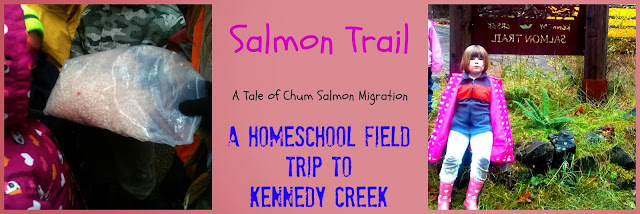Recently we went with friends to Kennedy Creek Trail between Shelton and Olympia, Washington.
This was a wonderful learning opportunity and one I hope we do again. The children were able to spy salmon and they learned through interactive play about the Chum salmon life cycle. The children were able to learn what they might see and how to observe spawning and "courting" behavior. They learned about how salmon might lay thousands of eggs but one a few survive and return to the stream that they were born in to spawn their own eggs. They learned about the single minded focus that the salmon have on their trek homeward; A focus so strong that they neglect eating. The children learned of the end process after spawning and what happens to the salmon as they drift down the stream, gentle rocked in a natural rhythm as their lives are complete. Rather than the children seeing the salmon dying as a sad end, they were encouraged to view it as a very important part of the ecosystem and cycle of life.
During the course of the outing the children witnessed several salmon on their journey up stream. A few children swore the seen the "courtship dance" back and forth. Who knows, they might have, children are more aware of the natural world than adults are sometimes. Regardless, seeing this lifecycle was a special treat and many go through their entire lives not able to witness this part of God's wonderful creation. Scientists still haven't figured out why salmon do what they do.
When preparing for this trip we bought a book called Salmon Creek (this is an affiliate link). Its a beautiful book! It reads beautifully and Bear fell instantly in love with the rich illustrations. It introduces young children to the life cycle of "Sumi" the Coho salmon.
 If you are local, please pay a visit to Kennedy Creek. They are open on weekends until Dec. 1. If you don't live around here but still want to learn about a wonderful fact in the natural world, go to your library and check out some books on salmon. Find out about the local fish in your area. How do they procreate? Discuss with your child what spawning is and how the salmon work their whole lives for this one act of selfless love. They swim, heedless of dangers, with one thought on their minds... to return to the stream of their birth. In some instances they return to the exact bend and spot to lay their eggs. They don't eat or sleep during this journey up stream. They spend the 2-3 years in the ocean preparing for this one act. Spawning salmon alone could cover a myriad of educational topics.
If you are local, please pay a visit to Kennedy Creek. They are open on weekends until Dec. 1. If you don't live around here but still want to learn about a wonderful fact in the natural world, go to your library and check out some books on salmon. Find out about the local fish in your area. How do they procreate? Discuss with your child what spawning is and how the salmon work their whole lives for this one act of selfless love. They swim, heedless of dangers, with one thought on their minds... to return to the stream of their birth. In some instances they return to the exact bend and spot to lay their eggs. They don't eat or sleep during this journey up stream. They spend the 2-3 years in the ocean preparing for this one act. Spawning salmon alone could cover a myriad of educational topics. Have your child journal about what they are learning. If you don't live in the Northwest, observe local creeks and discuss how fish might migrate in their depths. What kinds of places would make good hiding spots? What predators might they face?
Do you do nature lessons in your home?





No comments:
Post a Comment
Thank you for taking a few moments to share your comments with me. It means a lot. Thank you!